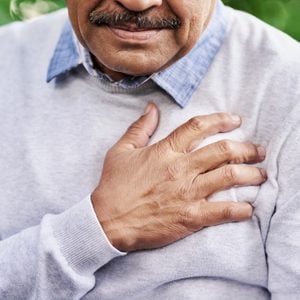Have Chest Pain When Running? What It Could Mean
Updated: Mar. 14, 2022
It's alarming to experience sudden chest pain when running. Here's what it could be trying to tell you.
Your heart on a run
Whether you’re starting a new running workout or have been pounding the pavement for years, you’re probably inclined to think sharp chest pain means the worst—a heart attack. But that’s not necessarily the case.
“When a patient describes a sudden, sharp pain in their chest, their symptoms are very unlikely to be angina, myocardial ischemia, or a heart attack. Angina, ischemia, and heart attacks typically feel like chest pressure ‘like an elephant sitting on my chest’ or chest tightness,” says cardiologist Tamara B. Horwich, MD, associate clinical professor of medicine/cardiology at the David Geffen School of Medicine at UCLA.
That’s not to say you shouldn’t worry about chest pain while running. Here’s what cardiologists want you to know about chest pain before you head out for a run. (And check out other causes of exercise-related chest pain besides a heart attack.)
Heart attacks and running
Good news for runners—according to research from the American Heart Association published in 2018 in the journal Circulation, sudden cardiac arrest among runners isn’t common. About 0.54 per 100,000 participants in half-marathons and marathons experienced sudden cardiac arrest, an electrical malfunction of the heart that causes it to stop beating. While that’s a small number, 71 percent died from cardiac arrest, primarily men, while running a marathon versus a half-marathon. Note that heart attacks can cause cardiac arrest, although not all do, and not all cardiac arrests are caused by heart attacks. (Here are the other differences between cardiac arrest vs. heart attack.)
Still, that doesn’t mean you should ignore chest pain when you’re running. “Not all chest pain is cardiac chest pain, but the runner should listen to the body, and if something doesn’t feel right, they should get evaluated,” says sports cardiologist Eugene Chung, MD, director of sports cardiology at the Michigan Medicine Frankel Cardiovascular Center and chair of the American College of Cardiology’s section on sports and exercise cardiology.
Be aware of the signs of a heart attack:
- Chest pain in the center of your chest that comes and goes or lasts for more than a few minutes
- Chest pain that feels heavy or tight
- Pain or discomfort in one or both arms, the back, neck, jaw, or stomach
- Shortness of breath
- Nausea, light-headedness, fatigue
- Cold sweats
- Some women may not feel chest pain and somewhat more likely to have shortness of breath, nausea/vomiting, jaw pain, or back pain as heart attack symptoms.

Possible causes of heart-related chest pain when running
Angina
“Chest pain with exertion could be a sign of angina—pain from supply-demand mismatch to the heart itself due to a blockage or blockages,” says Dr. Chung. These blockages in the coronary arteries limit the blood flow to the heart. The trademark signs of angina you should be aware of are accelerating chest pain and/or shortness of breath with exercise, pain that radiates to the jaw, back, or left arm, nausea, and vomiting, Dr. Chung says.
“If these symptoms do not resolve quickly with rest, I would seek medical attention right away,” says Dr. Chung. Fainting in the middle of exercising is also something not to take lightly. If it is an isolated event, it might not require calling the doctor right away. Still, if there are residual symptoms, such as multiple fainting episodes, medical attention is warranted, Dr. Chung says. (Here are the most common running mistakes.)
Supraventricular tachycardia
Talk about something that messes with your stride. Try saying “supraventricular tachycardia” while you’re running, or SVT for short. “A new arrhythmia (meaning you haven’t experienced it before), such as SVT, a fast arrhythmia from the top chambers of the heart can cause chest discomfort, shortness of breath, and or palpitations,” says Dr. Chung.
Though sometimes SVT has no symptoms. Normally, the heart beats 60 to 80 times per minute. In SVT, it is typically more than 100 beats per minute. SVT isn’t usually a cause for concern, but you should always call your doctor or seek medical attention when you have a racing heartbeat.
If you experience frequent bouts of SVT, your doctor may teach you how to do the Valsalva maneuver to help slow down your heartbeat. In this method, you “bear down,” meaning you try to breathe out using your stomach muscles without letting air out of your nose or mouth. If that doesn’t work, your doctor may prescribe medications to slow down the heart rate.
Hypertrophic cardiomyopathy
Hypertrophic cardiomyopathy (HCM) occurs when the heart muscle thickens over time, making it harder for the heart to pump blood. Usually, the thickening occurs in the left ventricle—the chamber in charge of pumping oxygen-rich blood to the body. This creates problems as the heart can’t pump the normal amount of blood needed, or blocks blood flow from the heart.
Some people will have no symptoms. Others may have chest pain that comes on with exertion, palpitations, and shortness of breath. Only rarely do people with HCM experience a heart attack. Still, you should check in regularly with your doctor to talk about your risks and discuss preventive treatments such as beta-blockers and channel blockers to relax the heart muscle.
Common causes of chest pain when running not related to the heart
Dehydration
Dehydration can impede the heart’s ability to pump blood efficiently—and that can cause an increased heart rate, rapid breathing, irregular heartbeat, or palpitations, and chest pain or discomfort. According to the Institute of Medicine, men should try to get at least 100 ounces of total fluids a day (about 13 cups) and women at least 75 ounces (about 9 cups) a day. That includes anything you eat or drink that contains water.
Prevent dehydration by drinking water and eating water-rich foods throughout the day and before, during, and after running. (Here’s how much water you need to stay hydrated.)
Vocal cord dysfunction
Vocal cords play a key role in everyday life. They open when we breathe and close when we speak, swallow, or lift heavy objects. The disfunction comes into play when we need the vocal cords to stay open for breathing, but they remain closed.
The malfunctioning motion causes a narrowing of the voice box and less room for air to flow through the vocal cords, resulting in a highly sensitive or reactive airway. It feels like you’re not getting enough air from your lungs. Dr. Chung says this be a culprit for chest discomfort while you’re running, as one of the triggers of vocal chord dysfunction is exercise. A nonmedical approach is most common with respiratory retraining therapy.
Exercised-induced asthma
Exercise-induced asthma can happen to people who don’t have asthma. If you start coughing, wheezing, have shortness of breath, and a tight feeling in your chest or chest pain or discomfort shortly after you started running, it could point to exercise-induced asthma. According to the American Academy of Allergy, Asthma, and Immunology, people with this condition are highly sensitive to both low temperatures and dry air.
You don’t necessarily have to forgo running when it’s cold and dry outside. Be sure to warm-up, slowly and cool down after a run. Try wearing a mask or scarf over your mouth to breathe in warmer and moist air—indoors and outdoors. If problems persist, call your doctor. You might need to take prescription meds regularly or use an inhaler just before exercising.
Heartburn
Dr. Chung says heartburn patients usually describe chest pain from heartburn as a sharp central pain. So, it’s no wonder chest pain as intense as that would stop people in their tracks. But heartburn also comes with a bitter, acidic taste in the mouth, and you might feel the same kind of pain when lying down later. When you run, all that motion of moving legs and arms can cause abdominal pressure, which may lead to some stomach acid sneaking out and traveling to the esophagus, causing chest pain.
To avoid heartburn, don’t lace up and run after a meal. A small snack before a run is less likely to cause heartburn. Avoid heartburn culprits such as spicy and acidic foods, carbonated drinks, and coffee if you find yourself getting heartburn while running.
Post pneumonia
Chest pain could be tied to a recent bout of pneumonia, Dr. Chung says. You might be itching to get back to running because you feel better, but lingering inflammation of the lungs from pneumonia could cause some chest pain or discomfort, especially when you have to take deeper breaths.
And sometimes, pneumonia can cause trouble in the pleural area—a lining that wraps around the lungs and lines the inside of the chest cavity. This causes chest pain with coughing or taking a deep breath. Be sure to inform your doctor and get the OK before returning to any physical activity after pneumonia. (Here are the infections that raise your heart attack risk, including pneumonia.)
Musculoskeletal pain
Sharp chest pain that comes on suddenly and disappears quickly is more likely due to muscular, joint, or skeletal pain such as costochondritis, Dr. Horwich says. Costochondritis, a condition that causes pain around the breastbone and rib cage, can cause sharp chest pain and be worsened when you apply pressure to the area or move abruptly—like while running, Dr. Chung says.
The inflammation of the breastbone also makes it hurt to take deep breaths. Since the pain can radiate to the arms and shoulders, it closely mimics a heart attack. Although costochondritis isn’t a heart-related health issue, you should always get medical attention for unexplained chest pain—and your doctor can recommend the best pain reliever or over-the-counter anti-inflammatory drugs to treat the pain. (Here are the proven ways to fight inflammation.)
Covid-19
Runners who have recovered from Covid-19 (or those who want to start running for the first time) shouldn’t blast out of the starting gate without talking to their doctor first. “In the context of recovered infection from Covid-19, we also have to be concerned about the lingering effects of the coronavirus in the lung and heart,” says Dr. Chung. “I would wait 10 days after diagnosis or resolution of symptoms then gradually ramp up activity over the following seven days.”
Be sure to check in with your doctor if you’re a new runner and let them know your training plans.



